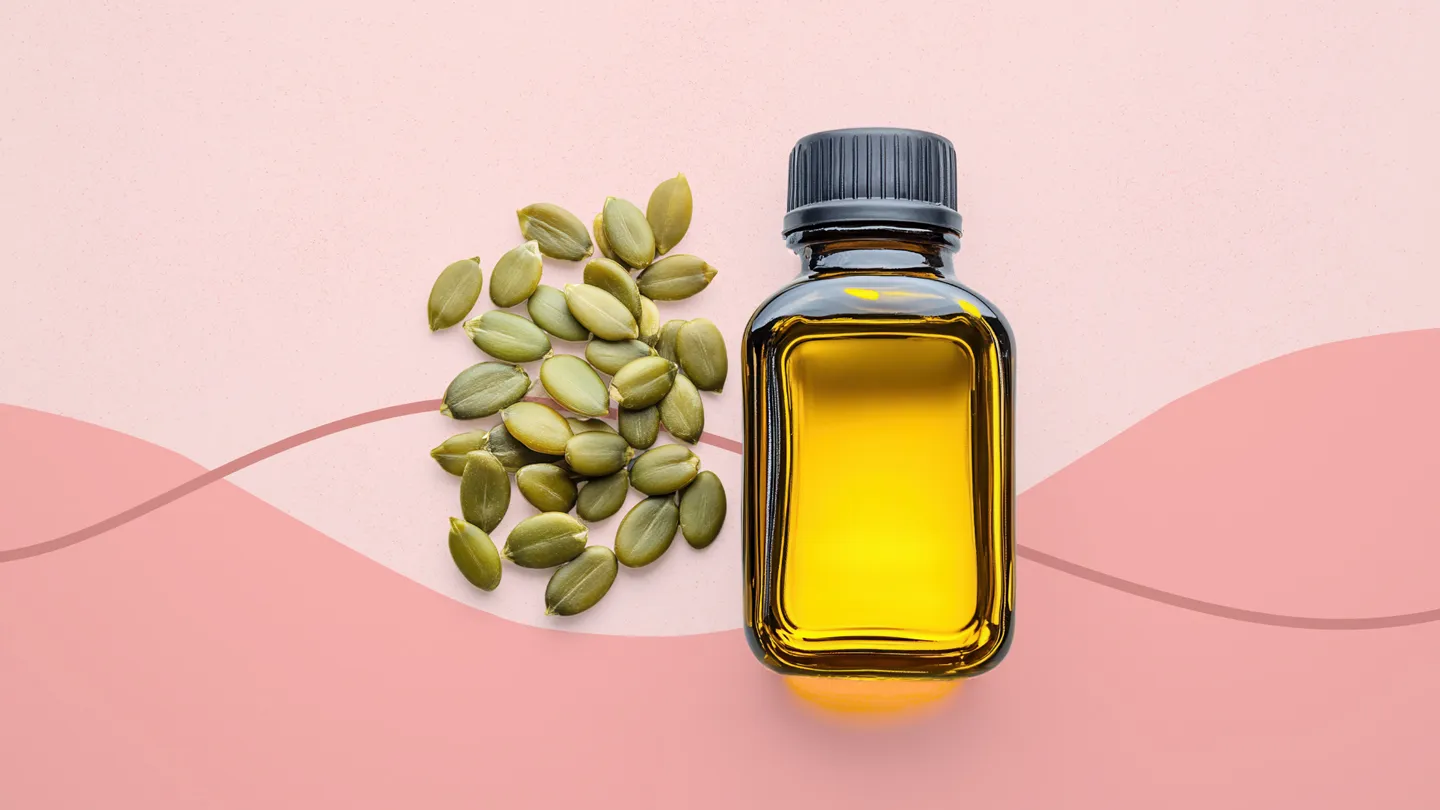Pumpkin Seed Oil May Reduce Menopause Symptoms
Could hot flashes be cooled with a bit of pumpkin seed oil? “Pumpkin seed oil may help balance hormones naturally due to phytoestrogens,” says Best. “Some studies show reduced hot flashes, joint pain, and mood swings in menopausal women.”
A small past study, for example, found that a 2,000 mg PSO supplement taken for 12 weeks reduced symptoms such as headaches, hot flashes, and joint pain in postmenopausal women, when compared with controls who took another oil, wheat germ. That said, this was a small pilot study from 2011 and it hasn’t been replicated, so more research is needed.
Pumpkin seed oil may mimic estrogen in the body, helping to ease the side effects of low estrogen during menopause. “Because phytoestrogens can bind to estrogen receptors, they are [potentially] able to have an estrogen-like effect on the body. This results in improved menopause symptoms,” explains Amy Brownstein, RDN, of Nutrition Digested in Oakland, California.
Pumpkin Seed Oil May Help an Overactive Bladder
If you have an overactive bladder, you’re far from alone, as a reported 23.3 percent of American adults live with this condition.
Pumpkin seed oil is believed to support bladder muscle function and reduce urgency,” says Best. “Clinical trials have shown improvement in urinary frequency and nighttime urination.”
A small past study of 45 participants from Japan found that PSO was linked with improvements in both frequency and urgency in participants with overactive bladder symptoms who received 10 g of pumpkin seed oil (specifically Cucurbita maxima, a pumpkin species from Japan) daily for 12 weeks.
That said, 10 g of pumpkin seed oil is a lot of PSO. “A standard dose for a pumpkin seed oil supplement is 500 to 1,000 mg [0.5 to 1 g] per day,” says Brownstein. Ten grams is 10 to 20 times that dose. Brownstein adds that the mechanism behind pumpkin seed oil for an overactive bladder is still unclear.
For urinary health or any other purpose, speak with your doctor or registered dietitian before starting a pumpkin seed oil supplement, to ensure it’s right for you and to get clarity on what an appropriate dosage for you may be.
Pumpkin Seed Oil May Improve Prostate Health
Pumpkin seed oil may also affect another component of the urinary tract in men: the prostate.
“Pumpkin seed oil supports prostate function by reducing inflammation and possibly lowering DHT levels,” says Best. “It’s often used as a natural remedy for symptoms of benign prostatic hyperplasia [enlarged prostate].”
In a small study out of Iran involving 73 men, both PSO and tamsulosin, a prescription medication used to treat benign prostatic hyperplasia, led to a reduction in enlarged prostate symptoms. Although the PSO wasn’t as effective as the tamsulosin, it didn’t result in dizziness, headaches, or other side effects reported by the group taking tamsulosin.
Similarly, in an older study out of Korea involving 47 men, subjects with an enlarged prostate received either pumpkin seed oil, palmetto oil, a combination of pumpkin seed and palmetto oils, or a placebo for 12 months. Those in the PSO group experienced improved urinary flow rate and reported better quality of life after three months. These results were achieved with just 320 mg of PSO per day — a relatively low amount to take in via pills or capsules. Even better news: No side effects were reported from supplementation.
Pumpkin Seed Oil May Support Mental Health
Research from Egypt in animals has shown that pumpkin seed oil works as well or even better than venlafaxine (an antidepressant) in reversing the effects of depression induced by stress. Other animal research has found that pumpkin seeds in general can relieve symptoms of anxiety and depression while also improving memory. However, these are early findings and they weren’t performed in humans, so large-scale clinical trials are needed to confirm safety and effectiveness.




